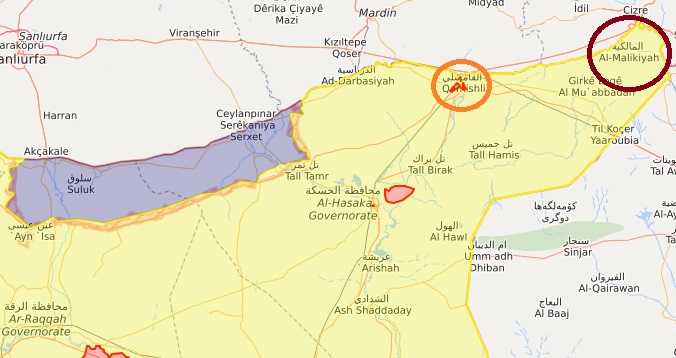
There's been much speculation about an imminent #Turkey intervention in north #Syria (another one) 🧵
The rationale behind such a move would be threefold:
1. The Kurdish threat
2. Electoral tactics (which might backfire)
3. Revisionist plans-strategic leverage re #Syria's future
The rationale behind such a move would be threefold:
1. The Kurdish threat
2. Electoral tactics (which might backfire)
3. Revisionist plans-strategic leverage re #Syria's future
Can #Turkey go ahead? The short answers is "yes". The long answer is "it's complicated".
If previous interventions are any indication, two things we know: 1. TR prepares the ground diplomatically and 2. remains flexible during operations, negotiating the outcome.
If previous interventions are any indication, two things we know: 1. TR prepares the ground diplomatically and 2. remains flexible during operations, negotiating the outcome.
A Turkish intervention would most likely mean that Ankara got the "green light" from #Russia and/or #US. A move west of Euphrates would mostly need the former; east of Euphrates, both.
In exchange, #Turkey would have to compromise as well vis-a-vis it's ideal objectives.
In exchange, #Turkey would have to compromise as well vis-a-vis it's ideal objectives.
What's the ideal then? The ideal would have two dimensions: one to the west (close to Euphrates, see below) and one east of Peace Spring territories in eastern #Syria (next tweet). The ideal objective re the former would be to finish what they started in 2019, >> 

namely expand the #Turkey-controlled territories (at least) along M4 highway to the west, capture #Kobani, cross #Euphrates, capture #Manbij & unite Peace Spring (blue) & Euphrates Shield (green) territories: clear out any Kurdish forces from Turkish border & west of Euphrates.
That would radically diminish the prospects of a Kurdish statelet on the border and not least its prospects for an exit to the Mediterranean - anyway an overly ambitious Kurdish aspiration.
The second dimension has the same logic but concerns the northeastern border of #Syria. >
The second dimension has the same logic but concerns the northeastern border of #Syria. >
In this case, Ankara would want to seal the border from Ras-al Ain all the way to Malikiyah. This would basically cut off any support to #YPG coming from #Iraq, #Syria, #Turkey (perhaps even #Iran). Turkish forces stationed in northern Iraq could support such an operation. 

However both fronts pose significant challenges. Provided that #Turkey got the go-ahead from #Russia and #US generally speaking, Kobani and Manbij would still be very difficult to capture. The former in particular is of great symbolic (in addition to its strategic) significance.
In the east, Qamishli has a similar importance and value, with both Kurdish and pro-Assad forces in the area. Not to mention pro-#Iran forces, and say nothing of the Russian presence.
For these reasons the risks are high for #Turkey.
For these reasons the risks are high for #Turkey.
In addition to their own interests/concerns, the Kurdish and Assad elements (seen as proxies) cannot leave #US and #Russia entirely indifferent.
After all, previous Turkish interventions have demonstrated their revisionist (not only defensive) character & influence consolidation
After all, previous Turkish interventions have demonstrated their revisionist (not only defensive) character & influence consolidation
So what can the outcome be? 2 scenarios stand out I think:
1. Have an agreed upon limited intervention (way off the aforementioned ideal)
2. Convince #Turkey not to proceed in exchange for some deal w #Kurds and #Assad. E.g. Some Kurdish units withdraw ceding control to Assad
1. Have an agreed upon limited intervention (way off the aforementioned ideal)
2. Convince #Turkey not to proceed in exchange for some deal w #Kurds and #Assad. E.g. Some Kurdish units withdraw ceding control to Assad
In these scenarios, the old Russian-Turkish formula on jointly patrolling certain areas could also be applied.
There's of course the possibility of a. no intervention at all & b. an irrational large scale intervention that'd disregard the aforementioned constraints
There's of course the possibility of a. no intervention at all & b. an irrational large scale intervention that'd disregard the aforementioned constraints
However I don't think they're the most likely. I believe that, under #Erdogan, another move in #Syria is a matter of time, in one way or the other.
Whether that will help him in the elections (if it happens in the next 1-2 years) is not certain.
Whether that will help him in the elections (if it happens in the next 1-2 years) is not certain.
Right now, domestic instability and polarization do not really play in his favour. #CHP is already against the prospect. Yet an intervention could help divide the opposition which is already struggling to create a united platform against #Erdogan.
[End of Thread]
[End of Thread]
A relevant report I wrote with @JohnPikpas back in 2020: What Peace for Syria? Spheres of Influence, the Sunni Opposition and the Day After
#Syria #Turkey #MidEast
prio.org/Publications/P…
#Syria #Turkey #MidEast
prio.org/Publications/P…
Here is the take in full
GeoBrief: Another Turkish intervention in #Syria? geopoliticalcyprus.org/2021/11/04/geo… via @GeopolCy
#Turkey #Mideast
GeoBrief: Another Turkish intervention in #Syria? geopoliticalcyprus.org/2021/11/04/geo… via @GeopolCy
#Turkey #Mideast
• • •
Missing some Tweet in this thread? You can try to
force a refresh



